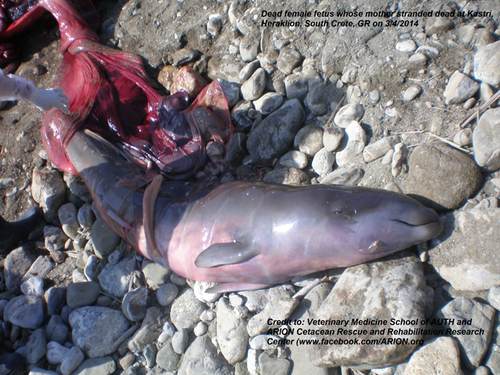While recent years have seen an apparent reduction in the number of sonar-related strandings, one of the world’s hot spots for such tragedies saw a rash of strandings in recent days. Two different stranding events occurred along the southern shore of Crete, the first involving 5-7 Cuvier’s beaked whales along a 16km stretch of coast, and the second occurring a few days later and 48km east, where three members of the same species came ashore. In both cases, many of the animals were refloated and returned to sea (and unknown fates), while four whales died, including a fetus that was apparently close to term.

A NATO naval exercise, Operation Noble Dina, is ongoing in the area, involving US, Greek and Israeli forces. This part of the Mediterranean has been the site of several previous strandings, as noted by NRDC’s Michael Jasney:
For Greece, none of this is new. In 1996 and again in 1997, dozens of beaked whales of the same species turned up along the Peloponnesian coast; in 2011, they stranded on the island of Corfu as well as the east coast of Italy, across the Ionian Sea. In each case, navies were training with high-powered sonar in the area. Indeed, according to the Smithsonian Institution and International Whaling Commission, every multi-species beaked-whale mass stranding on record everywhere in the world has occurred with naval activities, usually sonar exercises, taking place in the vicinity.
One of the ongoing areas of contention between environmental advocates and the US Navy and federal regulators is whether sonar training (and naval live-fire and explosion exercises creating loud and potentially harmful noise) should be planned to avoid areas with known concentrations of marine mammals, especially those, such as beaked whales, that are especially sensitive to noise. As it turns out, the area of this stranding is one of a large number of areas recommended as Areas of Special Concern for beaked whales by that the Scientific Committee of ACCOBAMS (Agreement for the Conservation of Cetaceans of the Black and Mediterranean Seas, a consortium of governments in the region). As reported by a long-time chair of its Scientific Committee, the recommendation fell on deaf ears when presented to the full ACCOBAMS meeting of the parties last year; military preparedness was the explicit reason for the rejection.
In the wake of the two stranding events, Operation Noble Dina continues, but was moved 100km south of Crete—now outside the boundary of the proposed Area of Special Concern, yet apparently still able to complete its military preparedness mission.
